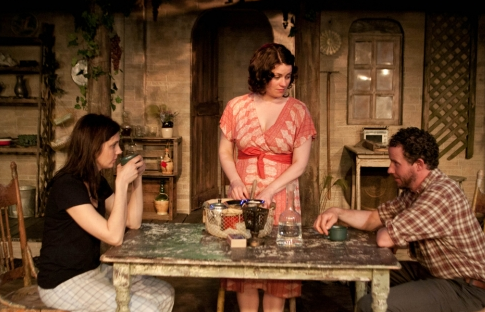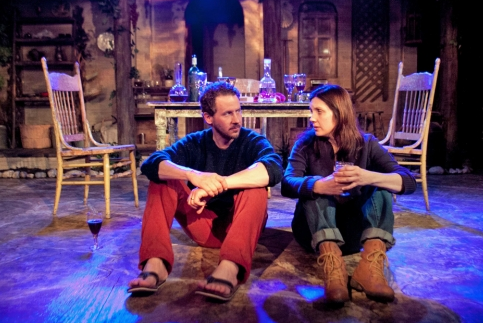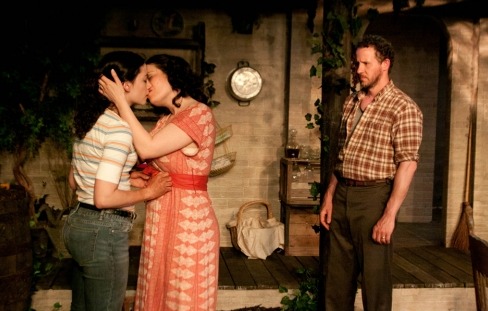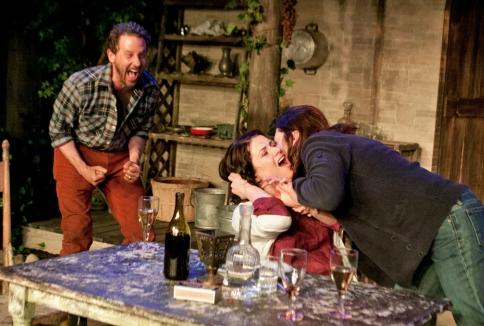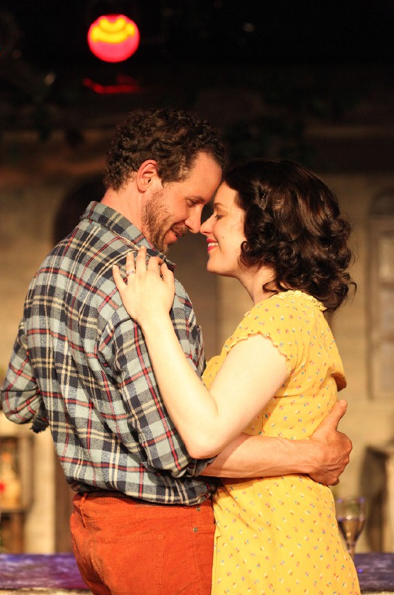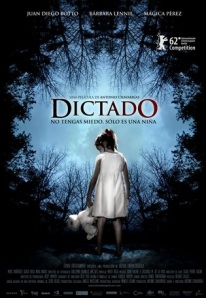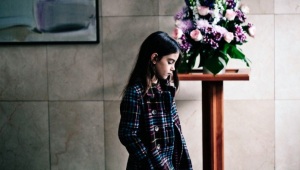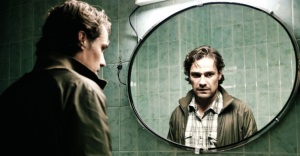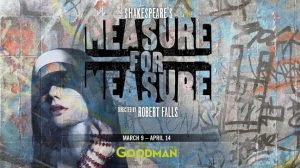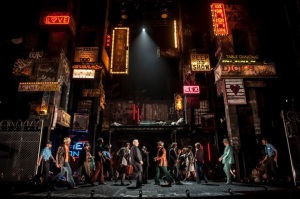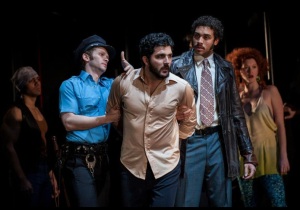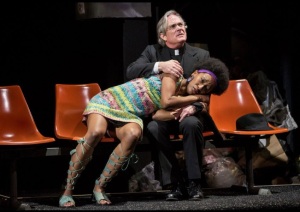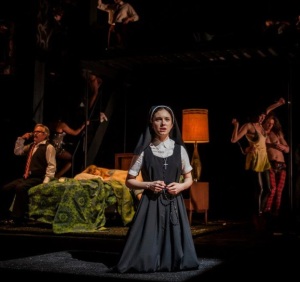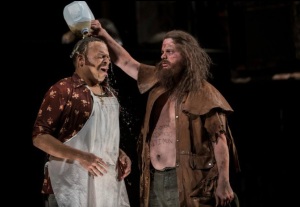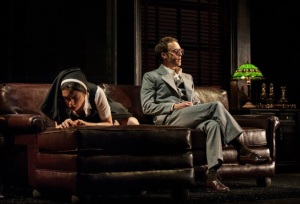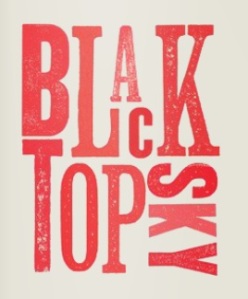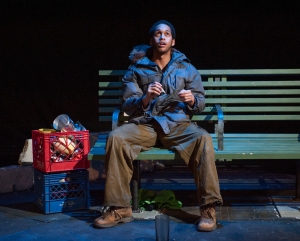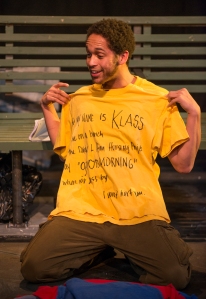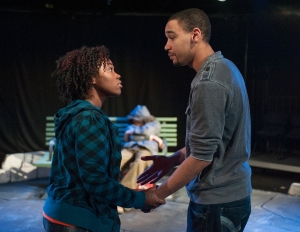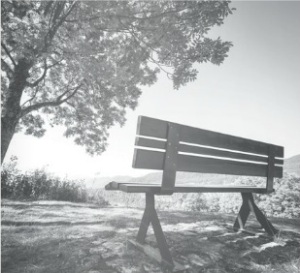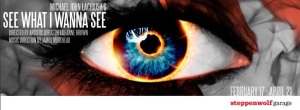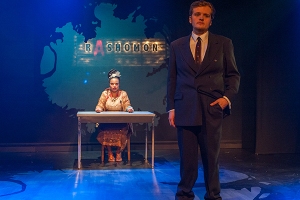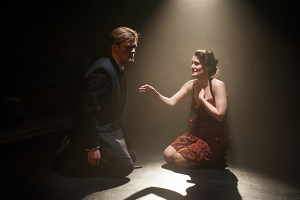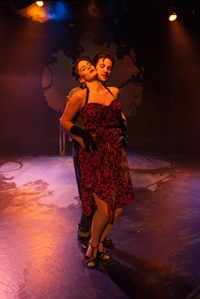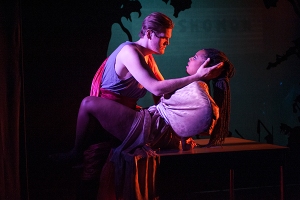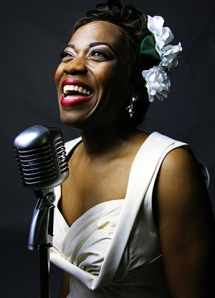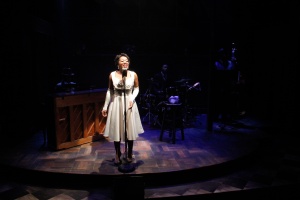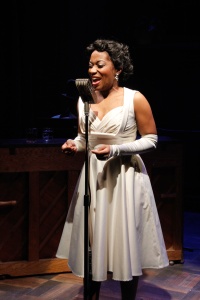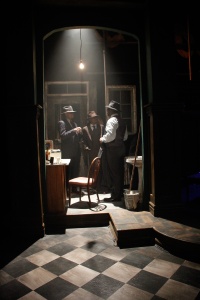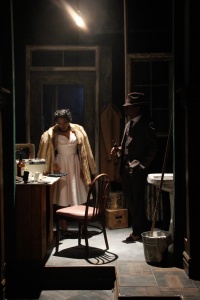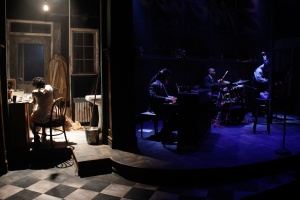Lascivious Something
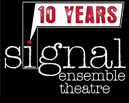 WHAT: Lascivious Something
WHAT: Lascivious Something
WHEN: May 4 – June 8 (schedule)
WHERE: Signal Ensemble Theatre (1802 W. Berenice Ave.)
RUNTIME: 1 hour and 50 min w/ a 10 minute intermission
WHO: Signal Ensemble Theatre
PRICE: $15-20
OUR RATING: Chance It!
 Sexually charged, mysterious and somewhat reclusive, Signal Ensemble Theatre’s Lascivious Something meanders through the treacherous relationships that ensue when one doesn’t fully leave behind the past (or that past comes after you). Set on a remote Greek island, an American expatriate has settled with his local wife and is enjoying the ancient Greek tradition of winemaking, although it is clear that this industry has become lost over the millennia. Then, as if a thunderbolt came crashing through the clouds, a familiar stranger from his past wreaks havoc upon the couple, presenting a situation that has no easy answers or quick getaways.
Sexually charged, mysterious and somewhat reclusive, Signal Ensemble Theatre’s Lascivious Something meanders through the treacherous relationships that ensue when one doesn’t fully leave behind the past (or that past comes after you). Set on a remote Greek island, an American expatriate has settled with his local wife and is enjoying the ancient Greek tradition of winemaking, although it is clear that this industry has become lost over the millennia. Then, as if a thunderbolt came crashing through the clouds, a familiar stranger from his past wreaks havoc upon the couple, presenting a situation that has no easy answers or quick getaways.
Sheila Callaghan’s script can be choppy at times, but that doesn’t mean you won’t fall in love with this production – it just depends on your tastes.
Adam: On a meticulously detailed stage that seems to be inspired in its positioning by the skene and orchestra of the ancient variety, four characters collide in the disturbing and sometimes reflective Lascivious Something. Vinification is the word of the moment, and the obsession with producing the perfect bottle central to August (Joe McCauley), as he becomes lost in the process of creating a legend in a bottle. But, as we see his past unfold before us, through anecdotes related to his wife, Daphne (Simone Roos) and the unexpected arrival of a long-lost friend (Georgann Charuhas), we start to wonder whether he is trying to bottle himself, almost, and the potential legend he could have been, were his choices just slightly different.
Time is a key element here, with alternate possibilities played out in sequence. Although this is sometimes confusing and becomes almost routine by the end, the use of time as a way of exploring unspoken or unrealised actions gives the work an interesting and unique angle. The playwright seems to be acknowledging the endless universes in which we could be living, or is she just hinting at the ponderings and fantasies we all have, thus explaining the more extreme outcomes.
But, above all, this is a play about gender, politics and sex. August is now settled with a child on the way, but old loves, both human and ideological, still play heavy upon him, like mind-ghosts creeping in the shadows, just waiting to pounce. Will he resign himself to his supposedly stable relationship (it’s not; his wife clearly has other sexual conquests of a more Sapphic type in mind) or resume rebellion, personally sexual and public social, back in California with his wayward love? Perhaps neither answer is satisfactory – the decisions were all made long ago.
One aspect of this play does prove itself to be rather weak in the offing, namely nudity. I, like most people of my generation, am immune to nudity, as it permeates just about every cable show imaginable in such a way as to make it commonplace and expected. This is less so in the theatre, but I am of the belief that most directors choose to portray nudity for shock value, rather than for any real plot driven reason. Unless the nudity is absolutely necessary for the scene, I view it as a last resort: simply there to give people something to talk about afterwards. It cheapens the play because it’s desperate and naively assumes that none of us have ever seen a breast before.
Alicia: As you walk into the theater, Buck Blue’s magnificently intimate Grecian set greets you with its warm embrace – an invitingly quaint villa with the utmost detail. Yet while its picturesque image astounds, it is simple enough to let the actors shine, highlighting Signal Ensemble Theatre’s mission on actor-focused work. And despite a few dips on the acting scale, the performances are quite powerful, with tension-filled moments lying masked in the dangerous minefield of August’s ultimate reckoning. Perhaps the most stand-out performance came from Cassidy Shea Stirtz (Boy), for while her stage time was the shortest, her moments were achingly raw and exciting.
Sexual tension and images of a carnal nature are pervasive in this work, and actresses Charahus and Roos play with this tension masterfully, always knowing when to hold back and when to strike and sink their teeth into their next biting remark or their outspoken revelation. They’re quick to the punch, and sultry in their manipulations.
Ultimately, this play was a little difficult for me to wrap my feelings around, for while the concept was new and exciting and the cast and crew worked crazy dramatic magic, Callaghan’s script was really rough. The twists and turns and moments of instant-replay were filled with tension bordering between threatening and arousing, which made for an exciting theater-going experience. Yet, near the end of the play the plot became muddled in a way that made it impossible to wade through, and I found myself exasperated. Director Ronan Marra and the Signal Ensemble team did what they could to make this script work, but ultimately I was caught between being compelled by their production, and being thoroughly confused with Callaghan’s thought-process.
Final Thoughts: Lascivious Something has powerful staging, interesting relationships and makes you feel like the Greek sun is beating down on you. However, certain aspects mean it will not be appreciate by all who lay eyes upon it.
